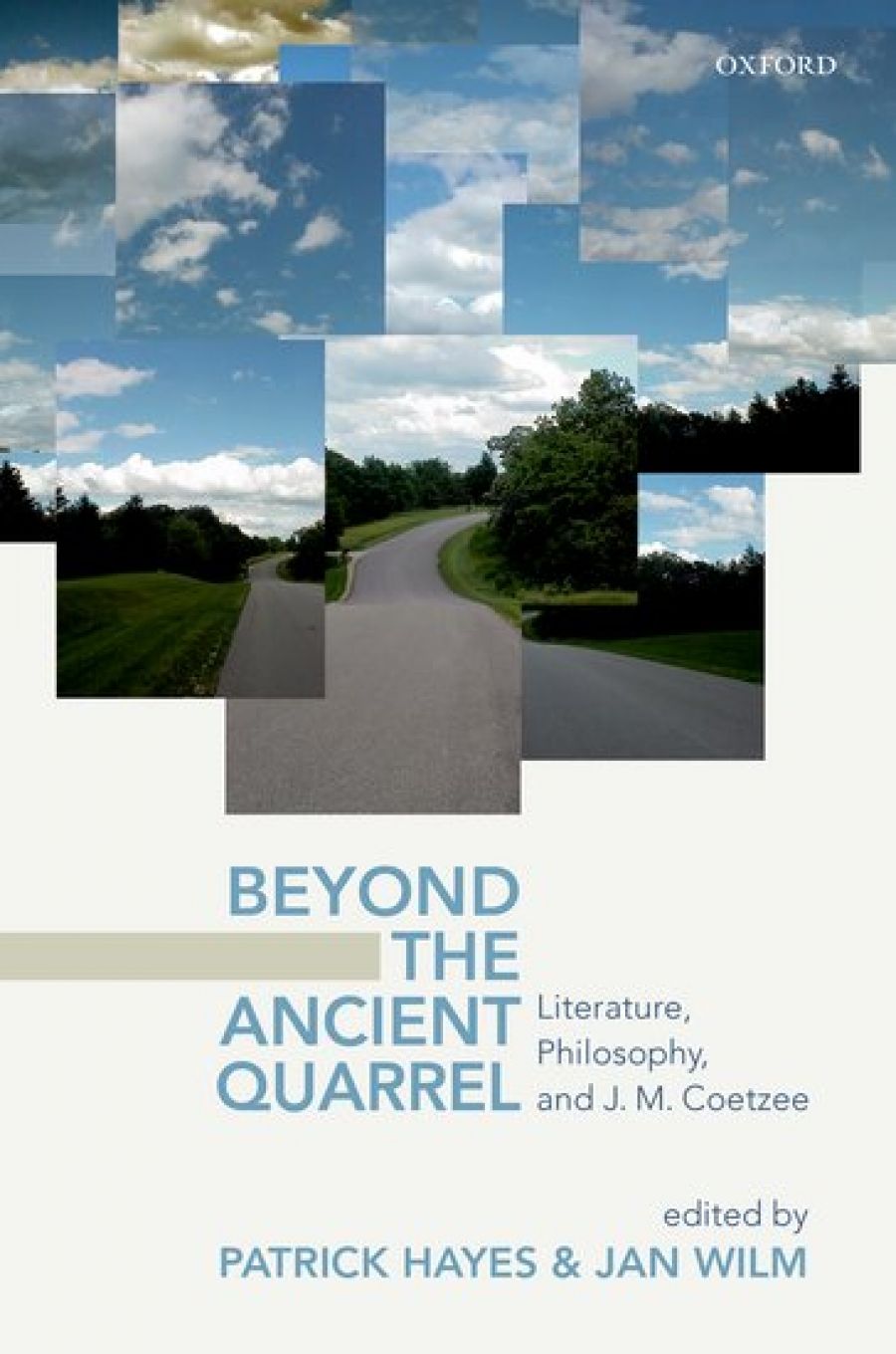
- Free Article: No
- Contents Category: Literary Studies
- Custom Article Title: Tim Mehigan reviews <em>Beyond the Ancient Quarrel: Literature, philosophy and J.M. Coetzee</em> edited by Patrick Hayes and Jan Wilm
- Custom Highlight Text:
Beyond the Ancient Quarrel: Literature, philosophy and J.M. Coetzee is a new collection of essays on J.M. Coetzee, perhaps the most important author of imaginative literature in the world today. Unifying the diverse strands of argument animating this thoughtful volume, the book’s editors, noted Coetzee scholars ...
- Book 1 Title: Beyond the Ancient Quarrel: Literature, philosophy and J.M. Coetzee
- Book 1 Biblio: Oxford University Press, $112.95 hb, 264 pp, 9780198805281
 J.M. Coetzee (photograph via the Nobel Prize)
J.M. Coetzee (photograph via the Nobel Prize)
It is not immediately clear why talk of this ancient quarrel should be relevant at this moment. Surely we know well enough what literature is, what philosophy does, and why the terms in which their ancient rivalry was contracted are beyond dispute? That we ask such a question at all can be attributed to the emergence of postmodern philosophy, a new and still heavily contested manifestation of the philosophical enterprise that seeks to augment the protocols of propositional logic with broader, more intuitive, and less obviously rational categories of analysis and understanding. More than any other factor, it is the entry of postmodern thinking into philosophy that stands behind this volume and cues many of its underlying assumptions about a writer who himself has long written in the mixed register of philosophy and literature and whose more recent works lay claim to constituting a species of philosophical fiction outright.
If the title of the collection comes across as a surprise, we are soon prepared for a second one: the dawning insight that Coetzee is nowadays better comprehended from the vantage point of this new type of philosophy than of traditional literary scholarship. This is a startling thought about a most literary of literary authors whose high credentials as a writer were acknowledged by the Swedish Academy with the award of a Nobel Prize in 2003. Such a thought leads to the view that Coetzee’s value for the current age lies precisely with the new mixed type of thinking that his fiction pioneers. Coetzee, indeed, is perhaps the first truly great writer who mines the postmodern era for its conceptual preoccupations and its characteristic locutions and yet whose imaginative scenarios effect a movement into something quite beyond such an era. Coetzee, in short, does not leave us with the intellectual and moral confusion we experience so keenly today, but he prepares us for a future in which we are called upon to develop a more ethically attuned and rigorous understanding of ourselves, our social goals, and our humanity.
The essays gathered here, without exception, give valuable clues to such a future. Four subdivisions in the essays provide additional purchase on the complex arguments mounted in the volume, though, in truth, each contribution has its own take on Coetzee’s worlds and their major concerns. The atmosphere the volume creates is accordingly one of Leibnizian ‘compossibility’ rather than mere possibility, which is to say, a rising sense of openness to expanding horizons, rather than any critical or material delimitation of them. And yet, despite this, it is the status of the real and the relation of ideas to what we are obliged to consider the real that is most at issue in the volume. While we are given many valuable leads here, the clearest and most productive approaches in the volume are those immersed in philosophical argument. Among them, Stephen Mulhall’s is the most sympathetically inclined towards the postmodern outlook and the least satisfied with the ‘narrow concept of utility-to-philosophy’ to which the editors declare themselves programmatically opposed in the introduction. For him, as for many contributors in the volume, literature is no handmaiden to philosophy, nor even to ethics. Literature under Coetzee’s pen instead looks like a special occurrence of the philosophical, one that downplays the flatness of normative reasoning, freeing up ground for irregular forms of thought such as solipsism and ‘private language’ (Wittgenstein) and the kind of succession issue the boy David discovers when he abjures the rules of counting in Coetzee’s recent novel The Childhood of Jesus (2013). The gaps in the succession of ordinal numbers, then, become the spaces in Coetzee’s fiction that the volume aims to explore – spaces beyond the strict calculus of reason, but which areperhaps more fertile for a future humanity than anything logic, on a rational model, currently makes available.
Where valorisation of the exception above the rule, the rights of feeling states over presumptive conceptual reason, the Levinasian ‘look’ of the destitute animal over the general look of common humanity finally gets us, however, must be considered – not so much despite this meritorious volume but because of it – an open proposition. If we follow the many productive analyses of Coetzee in this volume, we must content ourselves, for now, with conclusions arising from the ‘event’ of ‘ethical conversion’ (Derek Attridge), the exhortations of eros, though they be ‘morally unreliable’ (Eileen John), and the salutary aspects of an irony reminding us that ‘our ways of speaking and living are not fixed’ (Stephen Mulhall). What we get, then, is something carefully sifted but still weighty, a modest ‘conception of cognitive development’ (Alice Crary) that, like our current modernity, still promises much but nevertheless remains, tantalisingly, an unfinished project.


Comments powered by CComment